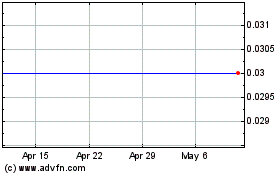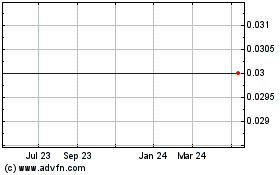Pancontinental Uranium Corporation (TSX VENTURE: PUC) ("Pancon")
and joint venture partner Crossland Uranium Mines Ltd. (ASX: CUX)
("Crossland") are pleased to update shareholders on the rare earth
element exploration program from the Charley Creek Project,
Northern Territory, Australia.
Highlights
-- Mineralogy study confirms Heavy Rare Earth Elements (HREE) occur as
Xenotime - indicating improved recoveries
-- 75 aircore drill holes have been completed at the Cattle Creek bedrock
Rare Earths Element (REE) prospect and initial results are due by early
May
-- 50 sq km of the Cockroach Dam alluvial REE area has been sampled -
results from the initial samples are in line with expectations
-- An initial resource estimate of the Cockroach Dam REE alluvials is
expected to be available by June
-- The regional stream sediment sampling program is near completion -
results from over 200 samples have been received; another 400 are
awaited.
REE Mineralogy study confirms presence of desirable Xenotime
An initial report on the investigation of mineralisation from
the alluvial Cockroach Dam Prospect has been received from ALS
Mineralogy Pty Ltd, a joint venture between ALS Laboratory Group
and JK Tech Pty Ltd, a subsidiary of University of Queensland. This
work has used a Mineral Liberation Analyser (MLA) to examine the
composition and texture of an initial batch of important samples
from Cockroach Dam.
One sample was from the initial pan concentrate that contained
39.1% Total Rare Earth Oxides plus Yttrium, as reported on November
1, 2010. Of the Total Rare Earth(TRE) plus yttrium oxides, 6.9%
represented the Heavy Rare Earth plus yttrium oxides ((HRE+Y)O),
that is, the oxides of, Terbium (Tb), Dysprosium (Dy), Holmium
(Ho), Erbium (Er), Thulium (Tm), Ytterbium (Yb), and Lutetium (Lu).
Yttrium (Y) is often grouped with the heavy REE (HREE).
This proportion is substantially higher in HREE than is present
in most REE projects currently under development, and suggests that
the Cockroach Dam Alluvial deposits may be a valuable source of
these HREE, as well as Light REE. Three of these HREE, Tb, Dy, and
Y, are classed by The US Department of Energy (USDoE) as both: in
critically low supply and of critical importance to renewable
energy development.
The ALS Mineralogy study at Cockroach Dam has found that these
critical HREE are present exclusively (except Y- see below) in the
mineral xenotime, the preferred raw material for extraction of
these elements. Xenotime is mixed with dominantly monazite in the
heavy mineral concentrate, and monazite contains the bulk of other
REE present in the mix. Some Y is present in one of three monazite
variations detected in the mix.
This new information suggests that a REE mix containing
significant amounts of HREE could be extracted from Cockroach Dam
heavy mineral concentrates. As the HREE occur in a separate mineral
phase with optimal properties (Xenotime), the metallurgical
behaviour of the concentrate should be enhanced. It may also be
possible to isolate stream drainages where the proportion of
Xenotime is higher. Regional stream survey data is now being
reviewed given this new understanding regarding Xenotime.
Samples collected from the bedrock discovery intersection in
hole CCA121, reported on March 9, 2011, contained a (HREE+Y)O
percentage of 13.8% of (TRE+Y)O: double the proportion found in the
Cockroach Dam Alluvial heavy mineral concentrate. There is also an
increased proportion of the Medium Rare Earths as defined by USDoE:
Samarium (Sm), Europium (Eu), and Gadolinium (Gd) of 5.9% of
(TRE+Y)O. Samples from this material are currently awaiting
mineralogical study at ALS Mineralogy.
Pancon/Crossland will be able to generate sufficient heavy
mineral samples for initial test work to develop a process route
for the concentrate, so an early start to metallurgical process
investigation can be made.
Drilling proceeding smoothly at Cattle Creek
-- Since commencement of drilling at the Cattle Creek bedrock REE prospect
on 31 March, a total of 75 aircore holes, averaging 45m deep, have been
completed.
-- 821 samples generated by this drilling have been deposited at the
laboratory. Initial results from these samples are expected by early
May.
Cockroach Dam Alluvial REE
-- Over 1300 shallow auger/soil samples of alluvium have now been collected
in the Cockroach Dam alluvial REE resource evaluation project, at sample
sites on 400m by 100m centres. A total area in excess of 50 square km
has now been covered, and a further area of 17 square km is currently
being sampled. This work will complete the field sampling component of
the exploration program.
-- 520 samples have been processed on site and are now at the laboratory.
At present 23 analyses of heavy mineral fractions have been received.
This number will increase substantially over coming weeks. Results
received to date are in line with expectations.
-- Aircore drilling to the alluvial basement, to follow up the shallow
auger drilling in the Cockroach Dam alluvial REE resource evaluation
project, will commence immediately after the Easter break.
-- A larger Wilfley shaking table has been purchased and is being modified
for the Joint Venture's purposes. When delivered, it will increase
throughput and allow generation of sufficient quantities of heavy
mineral samples for metallurgical test work.
-- An initial Resource estimate from the Cockroach Dam alluvial resource
evaluation program should be available in June.
Regional Stream Sediment Heavy Mineral Program
-- Over 600 samples have now been collected from 4,000 square km of
exploration licenses held by the Pancon/Crossland JV
-- Over 500 samples have been processed on site and submitted to the
laboratory
-- So far, 203 assay results have been received. These are still being
interpreted and followed up. Some recent samples have been taken to
follow up favourable results from the first pass survey.
-- One initial result has been the confirmation of a strong stream anomaly
coincident with the Cattle Creek Bedrock REE prospect, which may
represent an important additional alluvial heavy mineral source.
-- The discovery of Xenotime at Cockroach Dam puts new emphasis on the
search for the Heavy REE that are significantly occurring at Cattle
Creek, and in other results from the stream sediment survey.
-- The field aspects of this part of the exploration program are drawing to
a close.
Background on Importance of HREE
As detailed in the Crossland PowerPoint presentation released to
the market on 28 March 2011 and appended to this release, the 17
rare earth elements (REE) can be divided for convenience into light
(LREE), medium (MREE), and heavy (HREE) groupings. The presentation
utilises a recent US Department of Energy Report titled "Critical
Minerals Strategy" published in December 2010. This report provides
a good insight into a complex subject. A link to the report is
available from the Pancon Website www.panconu.com on the Investor
page.
The report highlights the fact that some REE, particularly the
HREE, are critically important to the Renewable Energy Sector in
both the short and longer term, and that these are subject to
critical supply shortages. This is one of the factors driving the
significant price increases that these commodities have seen in
recent times.
It is important to ascertain in what mineral species the HREE
occur, as in some cases the HREE may not be recoverable. The
optimal mineral for HREE extraction is Xenotime (yttrium
phosphate), which often contains the other HREE in significant
amounts.
All technical information in this release has been reviewed by
Geoff Eupene, Qualified Person for Crossland and Pancon.
About Pancontinental Uranium Corporation
Pancontinental Uranium Corporation ("Pancon") is a
Canadian-based company focused on uranium and REE discovery and
development, Through a 50:50 joint venture with Crossland Uranium
Mines Limited ("Crossland") of Australia,, Pancon has established
one of the strongest management teams in the uranium industry. This
management and operating team has unparalleled experience from
exploration, through development to operations, and includes people
who were instrumental in the discovery of two of the largest
uranium deposits in the world. Pancon and Crossland hold an
impressive uranium exploration portfolio with projects in prolific,
mining friendly districts.
Active exploration is ongoing at three Australian projects which
include Chilling, Charley Creek, and Kalabity. The Chilling project
has the potential to host a mirror image of a portion of the
renowned Alligator Rivers Uranium Field containing the large
Jabiluka, Ranger and Koongarra deposits. Charley Creek has the
potential for large, lower-grade, Rossing-type, granite-hosted
uranium deposits and REE. The Kalabity project lies in a district
of historic uranium/radium mining that contains a variety of known
uranium deposit styles.
Pancon has earned a 50% interest in this significant uranium and
REE project portfolio through the joint venture with Crossland
through the expenditure of A$8 million. Pancon and Crossland are
also pursuing exploration beyond Australia through an international
subsidiary company, Crosscontinental Uranium Limited, and immediate
plans include formulating an exploration program in Burkina
Faso.
ON BEHALF OF THE BOARD OF DIRECTORS
Rick Mark, President & CEO
For additional information, please visit our website at
www.PanconU.com.
Cautionary Language and Forward Looking Statements
This press release may contain "forward-looking statements",
which are subject to various risks and uncertainties that could
cause actual results and future events to differ materially from
those expressed or implied by such statements. Investors are
cautioned that such statements are not guarantees of future
performance and results. Risks and uncertainties about the
Company's business are more fully discussed in the Company's
disclosure documents filed from time to time with the Canadian
securities authorities.
Neither TSX Venture Exchange nor its Regulation Services
Provider (as that term is defined in the policies of the TSX
Venture Exchange) accepts responsibility for the adequacy or
accuracy of this release.
Contacts: Pancontinental Uranium Corporation Richard Mark
President and CEO 604-986-2020 or 1-866-816-0118 Pancontinental
Uranium Corporation Keith Patey Director of Communications
604-986-2020 or 1-866-816-0118 www.PanconU.com
Pancontinental Resources (TSXV:PUC)
Historical Stock Chart
From Dec 2024 to Jan 2025

Pancontinental Resources (TSXV:PUC)
Historical Stock Chart
From Jan 2024 to Jan 2025
